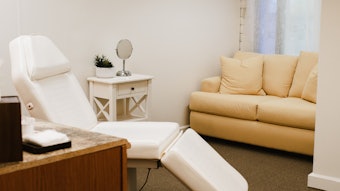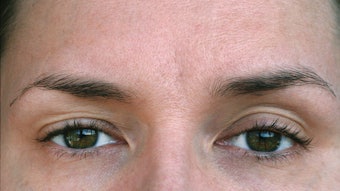
In the quest for radiant, youthful skin, medical and cosmetic professionals often explore an array of skin care products and treatments to achieve that elusive glow for their patients. However, amidst the myriad of serums, creams and procedures, there's one simple, often overlooked secret to unlocking vibrant skin: prioritizing sleep. As we delve deeper into the science behind skin care, it becomes increasingly evident that the quality and quantity of sleep profoundly impact the health and appearance of our skin, an insight essential for aesthetic practitioners to share with their patients.
The Benefits of Sleep for Skin Health
In our fast-paced society, sleep is frequently sacrificed for productivity, work commitments or late-night scrolling through screens. However, what many fail to realize is that adequate sleep is not a luxury but a necessity for overall well-being, including skin health. Research has shown that during sleep, our body undergoes crucial processes of repair, regeneration and detoxification, all of which are essential for maintaining healthy skin.
One of the most significant benefits of prioritizing sleep is its role in collagen production. Collagen, often dubbed the "fountain of youth," is a protein responsible for maintaining skin's elasticity and firmness. As we age, collagen production naturally declines, leading to wrinkles, fine lines and sagging skin. However, studies have demonstrated that adequate sleep promotes collagen synthesis, helping to preserve skin elasticity and reduce the visible signs of aging.
Sleep deprivation has been linked to increased levels of the stress hormone cortisol, which can break down collagen and lead to increased inflammation in the skin. This inflammation can exacerbate conditions such as acne, psoriasis and eczema, making the skin appear red and irritated. By ensuring that patients are well-rested, medical professionals can help mitigate these inflammatory responses and improve the overall health and appearance of the skin.
A lack of sleep also compromises the skin's ability to retain moisture, resulting in dryness, dullness and impaired skin barrier function. This can leave the skin more susceptible to environmental aggressors, such as pollution and UV radiation, further accelerating skin aging and damage. Conversely, adequate sleep promotes optimal hydration levels within the skin, leading to a plump, luminous complexion.
In addition to its direct effects on skin health, sleep plays a crucial role in regulating our immune system. A well-rested body is better equipped to fend off infections and inflammation, helping to prevent common skin ailments and promote faster healing of wounds and blemishes.
During the deeper stages of sleep, the body increases blood flow to the skin, which aids in the repair of damage caused by UV exposure and other environmental factors. This enhanced blood flow helps deliver essential nutrients and oxygen to skin cells, promoting cell turnover and giving the skin a healthy glow.
5 Tactics for Improving Sleep
Given the undeniable impact of sleep on skin health, medical and cosmetic professionals must prioritize restful sleep as an integral part of their recommendations. Incorporating good sleep habits can significantly improve the quality and duration of sleep for patients.
1. Maintaining a Consistent Sleep Schedule
Going to bed and waking up at the same time every day helps regulate the body's internal clock, making it easier to fall asleep and wake up naturally.
2. Creating a Relaxing Bedtime Routine
Establishing a pre-sleep routine, such as reading a book, taking a warm bath or practicing relaxation techniques, can signal the body that it's time to wind down.
3. Optimizing the Sleep Environment
Ensuring the bedroom is cool, dark and quiet can create an ideal sleep environment. Investing in a comfortable mattress and pillows can also enhance sleep quality.
4. Practicing Stress-Reducing Techniques
Techniques such as mindfulness meditation, gentle yoga or deep-breathing exercises can help calm the mind and promote deeper, more restorative sleep.
5. Recommended Hours of Sleep for Adults
Adults are generally recommended to get 7 to 9 hours of sleep per night to maintain optimal health and well-being. This range allows for adequate physical and mental recovery, supporting cognitive function, mood regulation and overall physical health. Consistently getting less than the recommended amount of sleep can lead to a host of health issues, including increased risk of chronic conditions such as heart disease, diabetes and obesity. Prioritizing sleep is crucial for maintaining a balanced and healthy lifestyle.
Treatments to Complement Good Sleep Habits
Some products and treatments can complement good sleep habits and enhance their benefits, supporting the skin's natural repair processes during sleep.
Recommending a nighttime skin care routine that includes hydrating serums and creams can help support the skin's natural repair processes during sleep. Ingredients like hyaluronic acid, retinol and peptides can work synergistically with the body's regenerative activities to optimize skin health.
Incorporating essential oils such as lavender, chamomile and sandalwood into your bedtime routine can promote relaxation and improve sleep quality. These calming scents can be used in diffusers, as pillow sprays or added to a warm bath before bed. By creating a soothing environment, aromatherapy can enhance the restorative effects of sleep, helping both the mind and body to unwind and rejuvenate overnight. Professionals can also suggest using silk pillowcases to reduce friction and prevent hair breakage and skin irritation.
The notion of "beauty sleep" is not merely a cliché but a scientifically backed concept that underscores the profound connection between sleep and skin health. By recognizing the importance of adequate sleep and making it a priority in our lives, we can harness its transformative power to achieve radiant, youthful skin from within. Medical and cosmetic professionals, in particular, have a unique opportunity to advocate for this natural, cost-effective and highly beneficial aspect of skin care. Integrating sleep education into patient consultations and treatment plans can help patients achieve their aesthetic goals more effectively and sustainably.
The importance of sleep for skin health cannot be overstated. Recognizing and addressing the impact of sleep on the skin can lead to better patient outcomes and more successful skin care treatments. Let's embrace the beauty of sleep and allow our skin, and that of our patients, to flourish in its restorative embrace. By making sleep a cornerstone of our skin care advice, we can unlock a natural, powerful tool for achieving the radiant, youthful skin that so many seek.
Sources:
The Journal of Clinical and Aesthetic Dermatology











